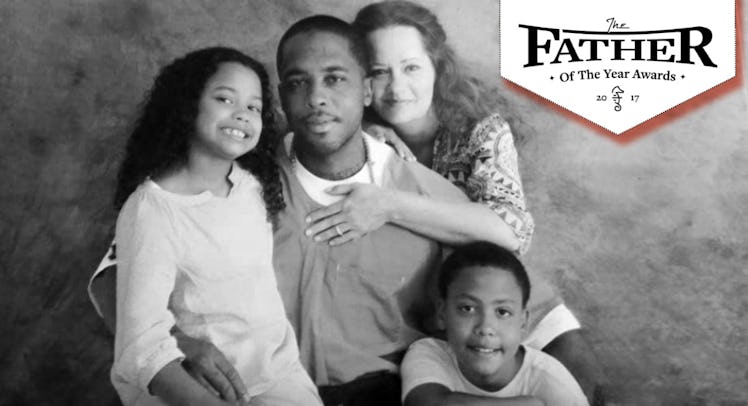John McDaniel Is a Father of the Year Honoree
Fatherly honors California inmate K98517 for being there for his children and helping other convicts reach out to their families.

The Father Of The Year Awards celebrate both influencers and unsung heroes who have made a major contribution to fatherhood, kids, and communities.
In 2000, John McDaniel held up a Southern California McDonald’s. Caught, found guilty of robbery and kidnapping, and struck with an incredibly harsh 35-year sentence, McDaniel became inmate K98517. Today, McDaniel is 37 years old, still inmate K98517, and still in jail. He’s one of approximately 750,000 dads behind bars and he is the father to two of the 2.7 million children with imprisoned parents. Like a disturbing portion of those fathers and children, he’s black. He’s also determined to be more than a number.
With his wife Karen, a social worker he met on the inside, McDaniel is the founder of ThePlace4Grace, a non-profit organization that helps teach jailed fathers how to be more involved in the lives of their children and families, preparing them for their eventual release.
“I look at other men around me and see a huge gap in their lives,” says McDaniel, who was a Crip before he was imprisoned. “They tell me they have kids and how stressful it is. Individuals feel a deep sense of abandonment in here. Their wives and children can help them get their lives together.”
ThePlace4Grace started small, as a holiday program that allowed families to visit prisons and help decorate Christmas trees with their incarcerated parents. The program branched out from there. The McDaniels have arranged for inmates (male and female) to tell their kids bedtime stories using audio recording.
“Some of these men break down and cry when they’re recording. It strikes an emotional chord,” John says. “These individuals look real tough on the surface, but this softens them up.”
McDaniel isn’t soft, but he is a family man. He calls James, his son, and Maya, his daughter, every night. He doesn’t ask them what’s going on in school because he knows. He follows up about the minutiae of their lives. He is a very real presence because that is what he demands of himself and because that is what he wants. When his kids come to visit him once a month, they don’t have to tell him what they’ve been up to. They can do other things. He can teach them to play football or just relax — to the degree that’s possible in a minimum security prison.
This is what makes McDaniel happy and what has made a very long, very hard wait — he should be up for parole soon, but it’s hard to know precisely when — bearable. Family is what makes McDaniel whole and that’s a particularly startling achievement considering that he didn’t come from a stable household. His father was a Crip too. He put himself together in jail. Or, better put, Karen and his kids did.
“Do we want broken men released into society?” Karen asks. “We need them ready and prepared to come home.”
Recently, the McDaniels have started an even more ambitious program, Camp Grace, that allows inmates to spend extended time with their children inside their institutions. Currently in operation at two prisons in California, the camp brings together inmates and their children for five straight days of arts and crafts and sports events, all on prison grounds. “It helps children understand they’re not the only ones who have an incarcerated parent,” McDaniel says. “That’s the most pivotal thing we offer there.”
To date, 20 inmates, who qualify by being discipline-free for a year, have taken part in the free program.
To avoid even the semblance of favoritism, McDaniel’s prison is currently not part the program. That’s hard for him. But he’s looking forward to the next thing, the big thing, the exit.
“The level of excitement and joy I hear coming from my husband is amazing,” Karen says. “This was a man who grew up hating anyone in authority, but he’s taken on a role he never thought he could take on. It’s easy for a well-meaning person to say to inmates, ‘You should do this or that.’ It’s different when it comes from someone who actually did change his life.”
This article was originally published on